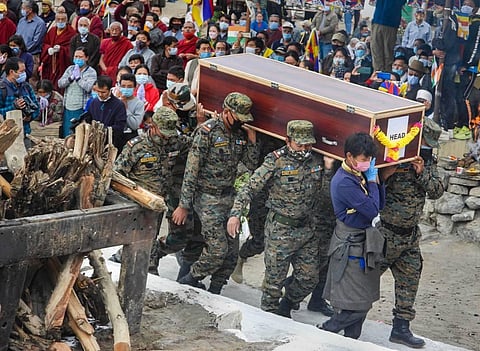

LEH: Death is about grief and sometimes pride too.
Three weeks after he died when he stepped on a landmine from 58 years ago, the home of Tenzin Nyima echoes softly with remembrances from those who knew him well and also those who knew of him.
The 53-year-old was a commando of the Special Frontier Force, an elite unit comprising mostly Tibetan refugees which was raised in 1962 following the war with China.
On the intervening night of August 29-30, Tenzin was killed in a landmine blast around the Pangong lake area, which has seen an amassing of Indian and Chinese forces.
His death was not related to the confrontation between Chinese and Indian troops the same night, official sources said.
The last rites of Tenzin, who leaves behind his wife, mother and four children, were conducted with military honours near his village in Sonamling Tibetan Settlement, Choglamsar, about five kilometres from Leh city.
"Many, many people came for the funeral," said his brother Nangdak.
"We are very sad, yet very proud. He laid his life for his motherland, for Tibet and India," Nangdak said.
The low buzz of prayers can be heard in the quietude of mourning at their home.
As relatives and lamas continue to throng to pay their condolences, Tenzin's mother and wife are in one room praying the departed soul with a hand prayer wheel.
In another, with a huge framed photograph of Tenzin in his uniform, lamas prepare for prayer.
In a third, lamps burn 24X7, bringing much needed warmth from the nippy air outside.
"The lamps have to be kept lit for 59 days," said Tenzin's brother-in-law Tundup Tashi.
Tenzin's death has brought pride to Tibetans refugees residing in India, said the villagers.
"Tenzin died for Tibet and India. That makes us so proud of his sacrifice," said Tseten Wangchuk, chief representative officer of the Central Tibetan Administration of the Sonamling Tibetan Settlement housing nearly 7,500 Tibetans.
"Although the next generation is born in India, their roots are intact, Being away from Tibet has not reduced our love for Tibet. India is our second home," he said.
The SFF is also said to have participated in the 1971 India-Pakistan war and in the Kargil operations in 1999.
Tenzin was born in India after his parents left following the Chinese occupation of Tibet in 1950.
He later enrolled in the SFF and worked there for 33 years till his death, his brother said.
Nangdak, who was also born in India, said their village in Tibet must be some 600-700 kilometres from Leh across the border.
"Even if we are born here, we have not forgotten our motherland," Nangdak said.
Every house in the village has someone working in the SFF, said a member of the force who did not want to be identified.
"So far, we were an anonymous force but now more people know about us. This worked for us, but now we are losing the strategic edge because of this," the SFF member, who claimed he was there when Tenzin was injured, added.
"We are very proud that he laid down his life while defending his motherland Tibet and India," he said.